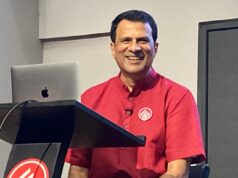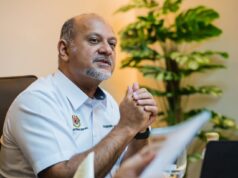WASHINGTON, Feb 25 – Japanese Prime Minister Shinzo Abe and US President Barack Obama confirmed last week that Japan will not necessarily be required to remove all tariffs if it takes part in Trans-Pacific Partnership
(TPP) free trade talks, Japan’s Jiji Press reported. The clarification by Obama in a bilateral summit meeting that there is room for exceptions to tariff elimination within the TPP framework is expected to smooth the way for a Japanese decision to take part in US-led negotiations to expand the free trade initiative.
Prior to the summit, Abe said he plans to make a decision on whether to take Japan into the TPP talks after checking with the US president if TPP members must agree to blanket tariff elimination. In a joint statement issued after the meeting, the two countries said they confirm that “should Japan participate in the TPP negotiations, all goods would be subject to negotiation.”
“Recognising that both countries have bilateral trade sensitivities,” the statement also said, “the two Governments confirm that, as the final outcome will be determined during the negotiations, it is not required to make a prior
commitment to unilaterally eliminate all tariffs upon joining the TPP negotiations.”
The Abe-Obama meeting at the White House, the first since Abe returned to office as the Japanese leader in December, lasted about 105 minutes including a working luncheon. During the luncheon, Abe briefed Obama on his Liberal Democratic Party’s election campaign pledge to oppose Japan’s participation in the TPP talks if it is required to agree to remove tariffs without exceptions. The LDP won a landslide in the House of Representatives election in December.
 Following a request from Abe, Obama reaffirmed the content of the joint statement on the TPP, according to sources familiar with their talks. In their meeting, Abe and Obama agree to strengthen the Japan-US alliance at
Following a request from Abe, Obama reaffirmed the content of the joint statement on the TPP, according to sources familiar with their talks. In their meeting, Abe and Obama agree to strengthen the Japan-US alliance at
a time of heightened tensions in East Asia. At a news conference, Abe said, “I want to declare with confidence that Japan has regained the bonds with and the trust of the United States and that the close Japan-US alliance has been fully recovered.”
Before leaving the US, Abe expressed concerns that Japan-US relations have been weakened under the previous government, led by the Democratic Party of Japan. Abe and Obama agreed that Japan, the United States and South Korea will work closely so that the United Nations Security Council will adopt a resolution imposing sanctions against North Korea for conducting a nuclear test earlier this month in defiance of international calls for restraint. They discussed the possibility of slapping financial sanctions, which are believed to produce effective results. Obama told reporters that they had close consultations on their
“determination to take strong actions in response” to North Korea’s provocations. To counter the reclusive state’s nuclear and missile development, Abe and Obama agreed to promote bilateral cooperation on missile defense, including the US deployment of additional X-band early-warning missile defense radar systems in Japan.
Abe told Obama that the Japanese government is considering a revision to its interpretation of the constitution to allow the country to exercise the right to collective self-defense, or coming to the aid of an ally under attack.
Regarding the tension between Japan and China over the Japanese-administered Senkaku Islands in the East China Sea, Abe assured Obama that Japan will always deal with the issue calmly. The Japanese and US leaders agreed to facilitate the relocation of the US Marine Corps’ Futenma air station in a congested urban area of Ginowan, Okinawa Prefecture, to the Henoko coastal area of Nago, also in Japan’s southernmost island prefecture.
Abe told Obama that he will take concrete action, an indication that his government may apply as early as for the permission of the Okinawa governor for reclamation work in the Henoko area to construct a replacement facility for the Futenma base.
They also agreed to accelerate efforts to return to Japan five US military facility sites south of the US Air Force’s Kadena base in Okinawa. Elsewhere in their meeting, Abe said the Japanese government will aim to gain lawmakers’ approval for legislation to ratify an international treaty on child custody during the ongoing session of parliament through June. The treaty, the Hague Convention on the Civil Aspects of International Child Abduction, lays down rules on parental custody of children after the breakups of cross-border marriages.
BERNAMA










